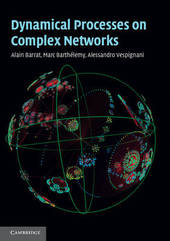
|
Dynamical Processes on Complex Networks
Paperback / softback
Main Details
| Title |
Dynamical Processes on Complex Networks
|
| Authors and Contributors |
By (author) Alain Barrat
|
|
By (author) Marc Barthelemy
|
|
By (author) Alessandro Vespignani
|
| Physical Properties |
| Format:Paperback / softback | | Pages:361 | | Dimensions(mm): Height 245,Width 173 |
|
| Category/Genre | Computer networking and communications |
|---|
| ISBN/Barcode |
9781107626256
|
| Classifications | Dewey:511.5 |
|---|
| Audience | | Professional & Vocational | |
|---|
| Illustrations |
98 Line drawings, unspecified
|
|
Publishing Details |
| Publisher |
Cambridge University Press
|
| Imprint |
Cambridge University Press
|
| Publication Date |
11 October 2012 |
| Publication Country |
United Kingdom
|
Description
The availability of large data sets has allowed researchers to uncover complex properties such as large-scale fluctuations and heterogeneities in many networks, leading to the breakdown of standard theoretical frameworks and models. Until recently these systems were considered as haphazard sets of points and connections. Recent advances have generated a vigorous research effort in understanding the effect of complex connectivity patterns on dynamical phenomena. This book presents a comprehensive account of these effects. A vast number of systems, from the brain to ecosystems, power grids and the internet, can be represented as large complex networks. This book will interest graduate students and researchers in many disciplines, from physics and statistical mechanics to mathematical biology and information science. Its modular approach allows readers to readily access the sections of most interest to them, and complicated maths is avoided so the text can be easily followed by non-experts in the subject.
Author Biography
Alain Barrat is Senior Researcher at the Centre de Physique Theorique (CNRS and Aix-Marseille University, France) and at the Institute for Scientific Interchange in Turin, Italy. His research interests are in the field of out-of-equilibrium statistical mechanics. Marc Barthelemy is Senior Researcher at the Institute for Theoretical Physics (IPhT) at the Commissariat a l'Energie Atomique et aux Energies Alternatives (CEA), France. His research interests are in the application of statistical physics to complex systems. Alessandro Vespignani is Sternberg Distinguished Professor in Physics, Computer Science and Health Science at Northeastern University, USA. He is also Fellow of the Institute for Quantitative Social Sciences at Harvard University and Scientific Director of the Institute for Scientific Interchange Foundation in Italy.
ReviewsReview of the hardback: 'With a focus in dynamical processes, this book is an excellent introduction ... on the statistical mechanics approach of networks ... Not only [does] it consist of a wide array of commonly used techniques in the discipline but also it provides multitudes of the techniques' applied examples ... this book could serve as an introduction book and a reference to new-to-the-topic JASSS readers. To conclude, I believe that this book has contributed another step in integrating the vast multidisciplinary approaches in network science.' Journal of Artificial Societies and Social Simulation Review of the hardback: '... the book does a terrific and admirable job at putting some order into the wealth of research that has emerged during the last decade ... a fantastic resource book on dynamical processes on complex networks, and its wide scope promises to keep it relevant for several years to come.' Journal of Statistical Physics Review of the hardback: '... a very useful book that fills an important gap in the market of books on networks ... I will be opening this book whenever I want to start modelling a dynamical process on a network.' Contemporary Physics 'The book does a remarkably good job in getting to the mathematical foundations of dynamical processes and complex networks. Hence, it should belong in the bookshelf of any sociologist who is seriously interested in complex and dynamic networks. It gives a great overview of techniques in the field and provides the mathematical depth one wishes for in a manner sociologists can understand. In sum, the book has potential to become a reference like Wasserman and Faust (1994) and offers significant (technical) value to sociologists who seriously want to get into the mathematics behind dynamical processes and complex networks.' Thomas U. Grund, Journal of Mathematical Sociology
|